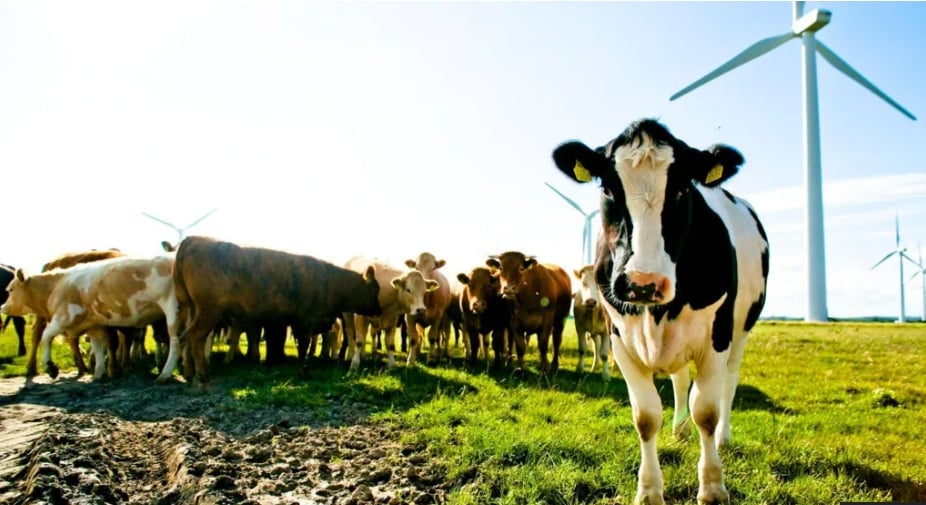November 27, 2025 | 19:15 GMT +7
November 27, 2025 | 19:15 GMT +7
Hotline: 0913.378.918
November 27, 2025 | 19:15 GMT +7
Hotline: 0913.378.918

The Climate Change Committee has emphasised the importance of low carbon farming.
And the executive "will need to broaden and accelerate action from today".
The CCC has recommended a 77% reduction in overall emissions by 2040 in its advice on Northern Ireland's fourth carbon budget.
As part of a new pathway to reach the legally-binding 2050 net zero target, the CCC has made 18 priority recommendations, including decarbonising electricity supply, support for low-carbon home heating and increasing infrastructure for electric vehicle charging.
In a statement, the Department of Agriculture, Environment and Rural Affairs of Northern Ireland (DAERA) said it welcomed the publication of the CCC's advice which "will need to be carefully considered by DAERA and by other departments to help inform the best pathway for Northern Ireland to decarbonise and to deliver on our net zero ambition in line with the principles of a Just Transition."
It added that a 16-week public consultation will be carried out, with a view to progressing legislation before the end of 2025.
Carbon budgets set out how much carbon can be emitted over a period of time.
The interim chair of the CCC, Professor Piers Forster, said the team was "delighted" to be able to present a "good news story" about how Northern Ireland can decarbonise.
"To deliver against its ambitious climate commitments, immediate action is necessary.
"Action by government, businesses, and farmers can drive a rapid shift away from fossil fuels, boost investment, and benefit households."
The Ulster Farmers Union (UFU) says the budgetary recommendations laid out by the CCC highlight the "drastic measures required to meet the unrealistic net zero goal in Northern Ireland (NI) by 2050".
In a statement the UFC said it has "consistently opposed forced cuts to livestock numbers, which would devastate rural communities and our national food security" and urged that "food production and climate action must be balanced".
It added that "farmers are committed to emissions reductions but must not be unfairly targeted" and warned that "suppressing local food production will only increase reliance on imports from countries with higher emissions".
Advice from the CCC is not policy but is usually accepted by governments.
Its recommendations for the first, second and third carbon budgets in Northern Ireland were put into law by the Assembly in December.
Electrification of technologies in transport, buildings, and industry, with the expansion and decarbonisation of the electricity system, will deliver 55% of the reductions required to meet the fourth budget.
While devolved authorities don't have control over all the areas, the executive does have power to act on the build-out of clean electricity, charging infrastructure for cars, and electric heating.
Acting on these would "significantly contribute" towards Northern Ireland's ambition as well as creating opportunities for new jobs, the CCC says.
It expects much of the needed investment to come from the private sector, but adds that government support is required for woodland creation and peatland restoration.
The CCC anticipates that demand for electricity will more than double as electrification replaces fossil fuels in home heating and domestic transport.
Low-carbon fuels, carbon capture and storage, low-carbon farming and nature-based measures will also make "important contributions".
More than three-fifths of the reductions required to meet the fourth budget will come from the domestic transport, buildings, and agriculture and land use sectors.
Agriculture is the largest contributor of greenhouse gases in Northern Ireland.
It is "essential" that low carbon farming practices are developed, according to the CCC.
And farmers should be encouraged "to diversify land use from livestock farming to measures such as peatland restoration and woodland creation".
Even then, "engineered removals" will have to be ramped up in the fourth carbon budget to keep Northern Ireland on track.
These are human-made processes to take carbon from the atmosphere and permanently lock it away.
They include Direct Air Carbon Capture and Storage, or DACCS, as well as Bioenergy with Carbon Capture and Storage (BECCS).
The CCC has relocated DACCS into Northern Ireland from elsewhere in the UK to model the pathway and says the executive would have to ensure conditions are in place to attract operators.
It adds that other choices could be taken by the Northern Ireland Executive.
The advice goes beyond what the CCC set out as Northern Ireland's contribution to the UK's Balanced Pathway in its seventh carbon budget.
That is because the CCC believes Northern Ireland's legally-binding 2050 Net Zero target requires a more ambitious effort.
BBC

(VAN) After the institutional merger, Da Nang possesses significant forest-carbon reserves and is proactively engaging in the carbon market, creating a new revenue stream.

(VAN) An Giang strengthens communication against IUU fishing, increases inspections and sanctions, and is determined to remove the EC’s “yellow card” while developing a sustainable fisheries sector.

(VAN) As green transition becomes a global trajectory, Viet Nam’s biggest challenge is not only technology and models, but how to ensure that capital flows reach the right beneficiaries.

(VAN) The Ministry of Agriculture and Environment must spearhead the construction of green governance, spanning decision-making processes and investment standards to policy evaluation mechanisms.

(VAN) The Agriculture and Environment sector of Khanh Hoa has achieved numerous milestones over the past 80 years, contributing significantly to the goal of establishing the province as a centrally governed city by 2030.

(VAN) Viet Nam is entering the pivotal period of 2025-2030, moving toward the formulation of the Remote Sensing Law, which will establish a legal foundation for the development of national digital data.

(VAN) The agricultural sector is finalizing the strategic framework for emission reduction, setting the goal of sharply cutting methane and 403.7 million tons of CO2 equivalent and moving toward Net Zero by 2050.